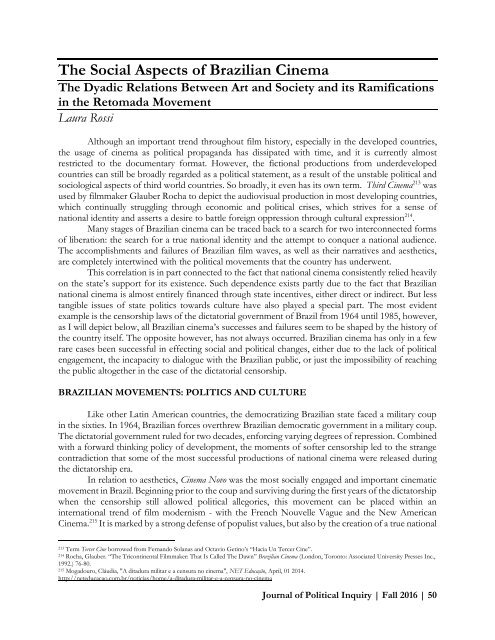Fall2016_Final
You also want an ePaper? Increase the reach of your titles
YUMPU automatically turns print PDFs into web optimized ePapers that Google loves.
The Social Aspects of Brazilian Cinema<br />
The Dyadic Relations Between Art and Society and its Ramifications<br />
in the Retomada Movement<br />
Laura Rossi<br />
Although an important trend throughout film history, especially in the developed countries,<br />
the usage of cinema as political propaganda has dissipated with time, and it is currently almost<br />
restricted to the documentary format. However, the fictional productions from underdeveloped<br />
countries can still be broadly regarded as a political statement, as a result of the unstable political and<br />
sociological aspects of third world countries. So broadly, it even has its own term. Third Cinema 213 was<br />
used by filmmaker Glauber Rocha to depict the audiovisual production in most developing countries,<br />
which continually struggling through economic and political crises, which strives for a sense of<br />
national identity and asserts a desire to battle foreign oppression through cultural expression 214 .<br />
Many stages of Brazilian cinema can be traced back to a search for two interconnected forms<br />
of liberation: the search for a true national identity and the attempt to conquer a national audience.<br />
The accomplishments and failures of Brazilian film waves, as well as their narratives and aesthetics,<br />
are completely intertwined with the political movements that the country has underwent.<br />
This correlation is in part connected to the fact that national cinema consistently relied heavily<br />
on the state’s support for its existence. Such dependence exists partly due to the fact that Brazilian<br />
national cinema is almost entirely financed through state incentives, either direct or indirect. But less<br />
tangible issues of state politics towards culture have also played a special part. The most evident<br />
example is the censorship laws of the dictatorial government of Brazil from 1964 until 1985, however,<br />
as I will depict below, all Brazilian cinema’s successes and failures seem to be shaped by the history of<br />
the country itself. The opposite however, has not always occurred. Brazilian cinema has only in a few<br />
rare cases been successful in effecting social and political changes, either due to the lack of political<br />
engagement, the incapacity to dialogue with the Brazilian public, or just the impossibility of reaching<br />
the public altogether in the case of the dictatorial censorship.<br />
BRAZILIAN MOVEMENTS: POLITICS AND CULTURE<br />
Like other Latin American countries, the democratizing Brazilian state faced a military coup<br />
in the sixties. In 1964, Brazilian forces overthrew Brazilian democratic government in a military coup.<br />
The dictatorial government ruled for two decades, enforcing varying degrees of repression. Combined<br />
with a forward thinking policy of development, the moments of softer censorship led to the strange<br />
contradiction that some of the most successful productions of national cinema were released during<br />
the dictatorship era.<br />
In relation to aesthetics, Cinema Novo was the most socially engaged and important cinematic<br />
movement in Brazil. Beginning prior to the coup and surviving during the first years of the dictatorship<br />
when the censorship still allowed political allegories, this movement can be placed within an<br />
international trend of film modernism - with the French Nouvelle Vague and the New American<br />
Cinema. 215 It is marked by a strong defense of populist values, but also by the creation of a true national<br />
213<br />
Term Tercer Cine borrowed from Fernando Solanas and Octavio Getino’s “Hacia Un Tercer Cine”.<br />
214<br />
Rocha, Glauber. “The Tricontinental Filmmaker: That Is Called The Dawn” Brazilian Cinema (London, Toronto: Associated University Presses Inc.,<br />
1992.) 76-80.<br />
215<br />
Mogadouro, Cláudia, "A ditadura militar e a censura no cinema", NET Educação, April, 01 2014.<br />
http://neteducacao.com.br/noticias/home/a-ditadura-militar-e-a-censura-no-cinema<br />
Journal of Political Inquiry | Fall 2016 | 50
















